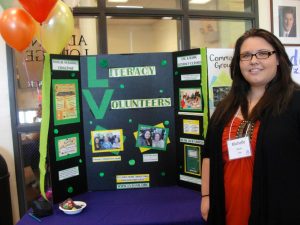The notion of Experiential Learning is often lost upon the students here at UNH, who may not have the slightest idea of what it entails. Experiential Education’s four components include faculty-mentored research, internships, study abroad, and service-learning. The latter usually is not very known within the student body, but this year through interactive learning events such as the Career for Common Goods programs, this sector has been more noticed. Service-Learning includes working/volunteering in the New Haven area with the purpose of bridging the gap between college and community.

On Thursday, April 11, the Office of Academic Service-Learning held an expo showcasing student’s work and dedication to matters outside campus throughout the school year. Students from the Community Work Study Program, and Academic Service-Learning Classes this semester presented what they had done for society, and why they did it.
Josephine Amos took the Dental Hygiene service learning course this semester; she and her classmates visited schools, naval bases, prisons, and even had a dental education stand at a North Campus football game. She and her classmates go to locations and educate people about oral hygiene, giving them toothpaste, toothbrushes, and floss, which the young kids especially appreciate.
During spring break, Josephine and some of her classmates went to a Cherokee Indian Reservation in North Carolina. They placed 400 sealants and treated 100 children during the week. “We just get such a reward from it,” said classmate Chelsea Fucci.
Students of the honors chemistry course worked with younger students on different science experiments to try and offer a different approach to learning, an interactive one. One pair, Jessica Bouchet and Ryan Finton, worked with students on an experiment called “Nails for Breakfast,” demonstrating how iron can be pulled out of cereal after the cereal has been crushed by a magnet. The two interacted with students of ESU Middle School, with the intent of “sparking an interest, especially in girls within the fields of science,” said Bouchet.
Sophomore Michelle Marks has been in the Community Work Study program since her freshman year, and works at Literacy Volunteers. She started tutoring classes and getting closer to the staff, and now is an assistant program manager. “I’ve experienced what the work does for the community,” Marks said.
Kimberly Acosta has worked at IRIS and says her involvement taught her “skills she could apply to anything,” and “how to deal with people of different cultures.”
AmeriCorps members are also represented among the student body, mainly within the dental hygiene students. AmeriCorps requires that an individual do 300 hours of community service within the year. Student Elaine Colvin has already reached 315 hours in just the past half of a year. “We’re out in the community doing so much anyways,” she said, so the hours build up easily. Colvin also remarks on how easy it was to work with everyone in the Service-Learning office, and would definitely return to the program in later years.
A student in the ASL Juvenile Justice course, Chris Festa, served as a senior mentor to kids at Common Ground High School. He was assigned to youth at risk; “You build a friendship, show them that you are reliable, you’re there for them,” observes Chris. “I would go right back to this place.”
Many CWS participants step out of their comfort zone in regards to major and work in a different aspect of the community. Janeska Cardona works as a membership program facilitator with Girl Scouts. Her group goes out to New Haven public schools and brings Girl Scouts to girls who may not have necessary funds to be part of an official Girl Scouts troop. She notices how different her work is from what she is doing as a CJ major, but still says, “It feels great walking into a program and the girls hug you.”
Awards were also handed out to high achieving participants of the ASL program. Congratulations to Marty O’Connor for receiving the Faculty Award, Lainey Colvin, Stefanie Jimenez and Christine Letsche for receiving the Student Award, and Tiffany Hesser and ESUMS for receiving the Community Partnership Award.
Everyone in the Service-Learning office is undeniably pleased with the amount of recognition this program has been acquiring on campus. Student worker Sara Dampf said, “I feel like service-learning is getting more publicity.” More students are looking for ways to get involved in the volunteering sector and to explore different opportunities downtown. The dedication to this program is very high, but the intrinsic goals and rewards achieved, many students believe, surpass everything.










